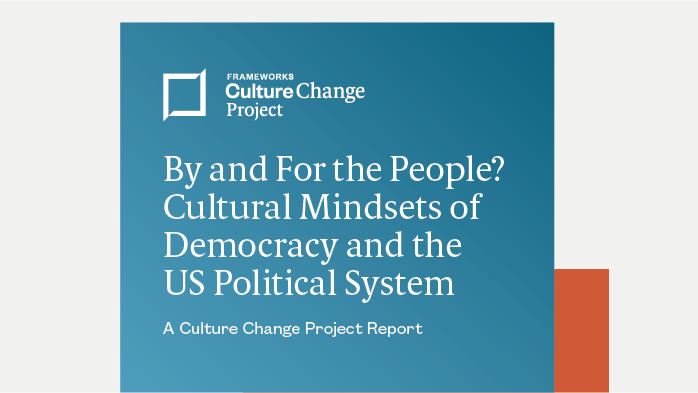
On Culture Blog / Apr 29, 2025
Communicating about Democracy Under Threat

To help build public resistance to attacks on our democratic institutions, we need to make ideas like democracy, authoritarianism, and the rule of law feel real and relevant to people’s everyday lives. To do that, we’ll have to navigate common beliefs and assumptions about how our government works.
Focus groups we conducted in February revealed three major obstacles to communicating about democracy in this moment:
First, people tend to equate government with the people in charge.
They focus on individuals in power, obscuring how institutions work to facilitate or obstruct our democracy. If people are dissatisfied with what is going on in government, they tend to raise one solution: get the “bad guys” out of power. While that is certainly important, this exclusive focus on individuals makes it difficult to talk about how our political institutions are currently under threat and failing to function properly—and what needs to be done to address that.
Next, people think democracy is simply whatever the US does.
This understanding—combined with a sense of American exceptionalism—makes it impossible to contemplate the idea that what’s happening in the US isn’t actually democratic, or that there’s anything we could do to strengthen our democracy.
Finally, abstract concepts like democracy and authoritarianism are difficult for people to relate to.
People don’t have deep understandings of these concepts, and the terms can come across as vague or disconnected from the reality of their everyday lives.
So what can we do to communicate about those abstract ideas at a time when we need to fight against authoritarianism and check executive power?
One possibility is to tap into something that surfaced in the focus groups again and again, across party lines: Feelings of uncertainty, powerlessness, and being at the whim of others.
“I’ve also never been in America in a time where everyone, whether rich or poor, is uncertain. Like even people who have the means to move to another country or to live a good life, are still worried about it… Another thing that worries me is not being able to do anything to change these things, and being powerless to an extent… You know, to me, that kind of scares me; that uncertainty, that level of uncertainty.”
—Research participant, February 2025
In focus groups, people talked at length about how they felt like they were living at the whim of people in power, uncertain of what to expect from the economy or massive upheaval at federal agencies:
“We’re talking millions, tens of millions of people affected by [cuts to federal agencies]. So yeah, I feel like they’re just kind of doing things a little bit too fast… How much is it going to affect, because they might press a button and we can’t go back, you know?”
—Research participant, February 2025
This inability to predict what was going to happen next caused a palpable sense of fear among some participants:
“I feel unsafe. I have young children. I have no idea what is going to unfold. We’re trying to put on our happy faces; be brave for them. They have no idea what’s coming down the line. We have no idea what’s going down the line, so I don’t feel like, no matter where you stand financially, what ethnicity you are… anything. You don’t know what’s coming down the line.”
—Research participant, February 2025
In addition to how widespread these feelings were, it is striking how much these sentiments echo academic literature about the experiences of those living through the erosion of the rule of law:
“If we are left merely to the will or pleasure of the power-holder… arbitrariness will be a constant possibility, and if so a constant worry. That is because, to put briefly what many writers have argued in many places: even the potential of its arbitrary exercise diminishes subjects’ freedom, causes their lives to be fearful, denies them respect, dignity, and moral equality, and destroys possibilities of fruitful cooperation among citizens and between citizens and states.”
—Martin Krygier, “The Rule of Law: Past, Presents, and Two Possible Futures”
There’s an opening here to make explicit the connections between the rule of law and the experiences of arbitrariness and uncertainty, giving a name to the feelings so many people are having.
We can start by affirming and acknowledging those feelings and then tracing one of their root causes: that we’re at the whim of people who are taking arbitrary actions whenever they want that have major consequences on our lives. We can put a name to that: executive overreach, the erosion of the rule of law, authoritarianism. We can ground those abstract concepts in the very real, very felt experience of uncertainty that people are living through.
We will be doing more research through the Culture Change Project to test these and other framing strategies that can be used to push back against authoritarianism. It’s a priority for us now and in the coming months—and we’re committed to sharing what we learn with you.
Issues: Government and Democracy
Countries: United States
